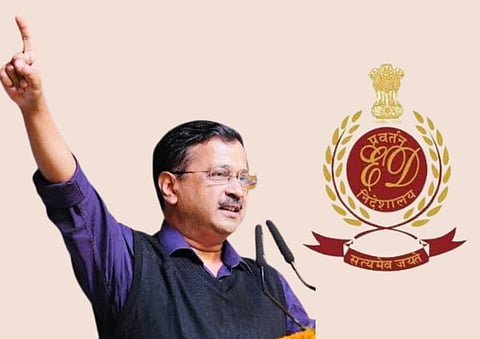
New Delhi: The Enforcement Directorate (ED) - a federal agency tasked at probing into financial irregularities - seems to have accelerated actions against Opposition leaders ahead of the 2024 general elections. The actions have created an environment of political turmoil across the country.
The agency arrested Jharkhand Chief Minister Hemant Soren last week on charges of corruption.
Soren is the fourth chief minister of the Opposition to come under the ED scanner. Earlier, former Chhattisgarh Chief Minister Bhupesh Baghel and his associates were named by the agency for allegedly being involved in an illegal online betting case.
Former Bihar Chief Minister Lalu Prasad Yadav and his son and former Deputy Chief Minister Tejashwi Yadav have been repeatedly questioned in an alleged “land for jobs” scam.
Delhi Chief Minister and Aam Aadmi Party leader Arvind Kejriwal has also been served multiple notices by the agency in the excise policy case, in which his deputy Manish Sisodia and party MP Sanjay Singh have already been arrested.
Satyendra Jain, another AAP minister in Delhi, has been lodged in prison for around two years in the same case. There are speculations that Kejriwal may soon be arrested for refusing to present himself for questioning.
The chief minister has maintained that the questioning was “politically motivated” and an attempt to arrest him to prevent him from campaigning during the 2024 Lok Sabha polls.
The Mooknayak reached out to Advocate Diksha Dadu, practices at the Supreme Court of India, to understand the legalities surrounding the summons and if the chief minister can be arrested based on non-compliance.
“This is not the first time a chief minister is being summoned by the ED. In other cases, it might not be compulsory to attend the interrogation; but if a summon has been issued under Section 50 of the PMLA, 2002, the person who has been called for questioning is bound to attend,” she said.
Owing to Kejriwal not attending the probe, the ED has moved to the Rouse Avenue Court against Kejriwal. It has registered a fresh complaint under Section 190 (1)(a) of Cr.P.C. read with Section 200 of the Code, Section 174 of the Indian Penal Code, 1860 and Section 63 (4) of PMLA, 2002.
“If a person is not attending the questioning, the ED can either issue fresh summons again and again or move an application to the court - asking the court to issue a non-bailable warrant. If the agency has strong evidence, it is empowered to visit the residence and arrest the person, which has happened in the case of Hemant Soren,” she explained.
The advocate said the ED cannot simply arrest, stating noncompliance. “In the Pankaj Bansal Vs Union of India case of 2023, the apex court had held that the ED has to compulsorily furnish the grounds of arrest to the accused in writing and that the agency cannot arrest people by simply citing non-cooperation to its summons,” she said.
AAP’s national spokesperson Priyanka Kakkar said the entire case is “politically motivated”. “The people of Delhi are very well aware that there is no such thing called liquor scam, and this is the reason why not a single penny has been recovered by any of our leaders by the ED,” she said, adding that “the matter is now pending in the court, and we will submit a response abide by whatever the it directs us”.
What’s Delhi’s Excise Policy
The ED has accused the Delhi government of indulging in corruption in its excise policy for the national capital. The policy, the agency alleges, facilitated cartelization among liquor traders and showed favouritism towards certain dealers who allegedly paid bribes to benefit from it.
These allegations have been consistently refuted by the AAP, which has maintained its stance that the policy was fair and transparent.
Following the controversy, the state government ultimately scrapped the policy. Subsequently, Delhi Lieutenant Governor VK Saxena recommended a Central Bureau of Investigation (CBI) inquiry into the matter. Following this recommendation, the ED initiated legal proceedings - registering a case under the PMLA.
Kejriwal has avoided attending ED probe on November 2 and December 21 in 2023 as well as on January 3 and January 18 of this year. The AAP leader deemed these notices as “illegal”.
The AAP announced that Kejriwal will not honor a fifth summon with regard to the money laundering case against the now-defunct Delhi excise policy.
You can also join our WhatsApp group to get premium and selected news of The Mooknayak on WhatsApp. Click here to join the WhatsApp group.